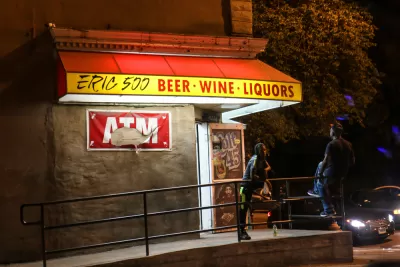A new zoning code in Baltimore will reduce the number of liquor stores in the city in hopes of reducing the violent crime rate. Will there be unintended consequences?

It was at least a decade ago when researchers from Johns Hopkins Bloomberg School of Public Health turned their attention to Baltimore’s effort to revise its decades-old zoning code. Many research papers, meetings, and draft revisions later, the results of the policy change they brought about—a reduction in the number of liquor stores in Baltimore’s residential neighborhoods—will finally take effect on June 5.
Research has shown that there is a definitive link between the number of liquor outlets and a city’s violent crime rate. Will the communities surrounding the closed stores actually experience the desired outcome? That will probably take another few years to determine. Still, the Baltimore story shows how innovative ideas can gradually be translated into real regulations. It also illustrates that even when the desired outcomes occur, members of the community can be negatively affected.
A few store owners have changed their businesses, but many others don’t quite get what’s about to happen to them, says Mario Chang, KAGRO’s president. “There are a lot of mom and pop owners and some of them have been there for 20 years, 30 years. These businesses were their retirement,” says Chang. “They don’t really understand about the closing.” Starting over will be hard for many of them.
FULL STORY: Closing Liquor Stores, Hoping to Gain Public Health

Planetizen Federal Action Tracker
A weekly monitor of how Trump’s orders and actions are impacting planners and planning in America.

Restaurant Patios Were a Pandemic Win — Why Were They so Hard to Keep?
Social distancing requirements and changes in travel patterns prompted cities to pilot new uses for street and sidewalk space. Then it got complicated.

Map: Where Senate Republicans Want to Sell Your Public Lands
For public land advocates, the Senate Republicans’ proposal to sell millions of acres of public land in the West is “the biggest fight of their careers.”

Maui's Vacation Rental Debate Turns Ugly
Verbal attacks, misinformation campaigns and fistfights plague a high-stakes debate to convert thousands of vacation rentals into long-term housing.

San Francisco Suspends Traffic Calming Amidst Record Deaths
Citing “a challenging fiscal landscape,” the city will cease the program on the heels of 42 traffic deaths, including 24 pedestrians.

California Homeless Arrests, Citations Spike After Ruling
An investigation reveals that anti-homeless actions increased up to 500% after Grants Pass v. Johnson — even in cities claiming no policy change.
Urban Design for Planners 1: Software Tools
This six-course series explores essential urban design concepts using open source software and equips planners with the tools they need to participate fully in the urban design process.
Planning for Universal Design
Learn the tools for implementing Universal Design in planning regulations.
Heyer Gruel & Associates PA
JM Goldson LLC
Custer County Colorado
City of Camden Redevelopment Agency
City of Astoria
Transportation Research & Education Center (TREC) at Portland State University
Camden Redevelopment Agency
City of Claremont
Municipality of Princeton (NJ)





























